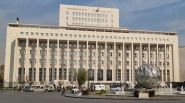- Home
- Middle East
- Efforts in Congress to Repeal the Caesar Act Amid Shifts in Syria

©This is Beirut
In a significant shift in US foreign policy, a growing bipartisan movement in Congress is pushing to repeal the Caesar Syria Civilian Protection Act of 2019. This push follows President Trump's recent executive order that lifted several longstanding US sanctions on Syria, coinciding with a transformative political climate in the region, particularly after the weakening of the Assad regime, which was the primary target of the sanctions established by the act.
While Trump's executive order revokes most enduring sanctions against Syria, it maintains restrictions against ousted President Bashar al-Assad, his inner circle, human rights violators, drug traffickers and others linked to chemical weapons activities and terrorist organizations. With this backdrop, US diplomatic circles in Washington are grappling to clarify the rationale behind these sweeping changes.
In a State Department briefing, officials emphasized the “importance of the opportunity presented to Syria, which Syria and the world must seize.” Many experts suggest that Syrian President Ahmad al-Sharaa is making significant progress. His willingness to engage with Israel and negotiate a ceasefire agreement has garnered attention. However, the ongoing fear of the repercussions of the Caesar Act is hindering vital investment in Syria, as the US administration encourages both European and Arab countries to increase their investments.
Amid these developments, the rationale for maintaining such extensive sanctions has weakened considerably. Rep. Joe Wilson (R-SC), a leading advocate for repeal, observed, “The Assad regime sanctioned by the Caesar Act no longer exists. This creates a window for potential reconstruction efforts that the sanctions may hinder.” Alongside him, Rep. Pramila Jayapal (D-WA) and Sen. Jeanne Shaheen (D-NH) are also championing legislative changes.
The proposals for repealing the act—designated as H.R. 3941 in the House and S. 2133 in the Senate—are gaining traction across party lines. Advocates argue that the sanctions have deterred essential foreign investment, which is critically needed for Syria's recovery. To expedite the repeal process, Wilson plans to attach the repeal to the National Defense Authorization Act. “I am trying to use every mechanism possible to repeal this law as soon as possible,” he remarked, stressing the importance of lifting sanctions to attract long-term foreign investment essential for rebuilding the war-torn nation. Successful integration of the repeal into budgetary discussions could accelerate the timeline for this initiative.
Proponents of repealing the Caesar Act emphasize that lifting the sanctions could facilitate immediate humanitarian relief for a nation still reeling from prolonged conflict. Humanitarian organizations increasingly report that sanctions hinder aid delivery, exacerbating the struggles of ordinary Syrians.
Repealing the Caesar Act could significantly alter the US role in Syria, positioning the country as a more constructive partner in the nation's recovery. “The focus should be on how the US can help stabilize the region; maintaining sanctions may alienate us,” said Shaheen.
The potential repeal of sanctions against Syria could have a range of significant consequences. It may grant the Syrian government increased financial independence. Additionally, changes in how humanitarian aid is distributed could foster a more collaborative relationship between the Syrian government and international organizations.
Read more




Comments